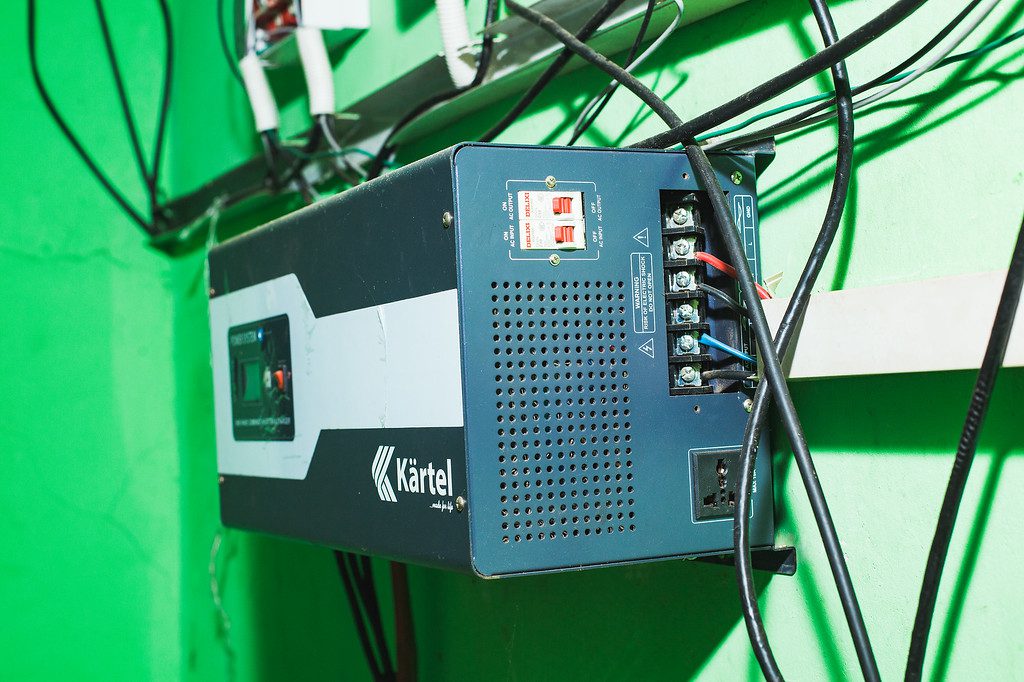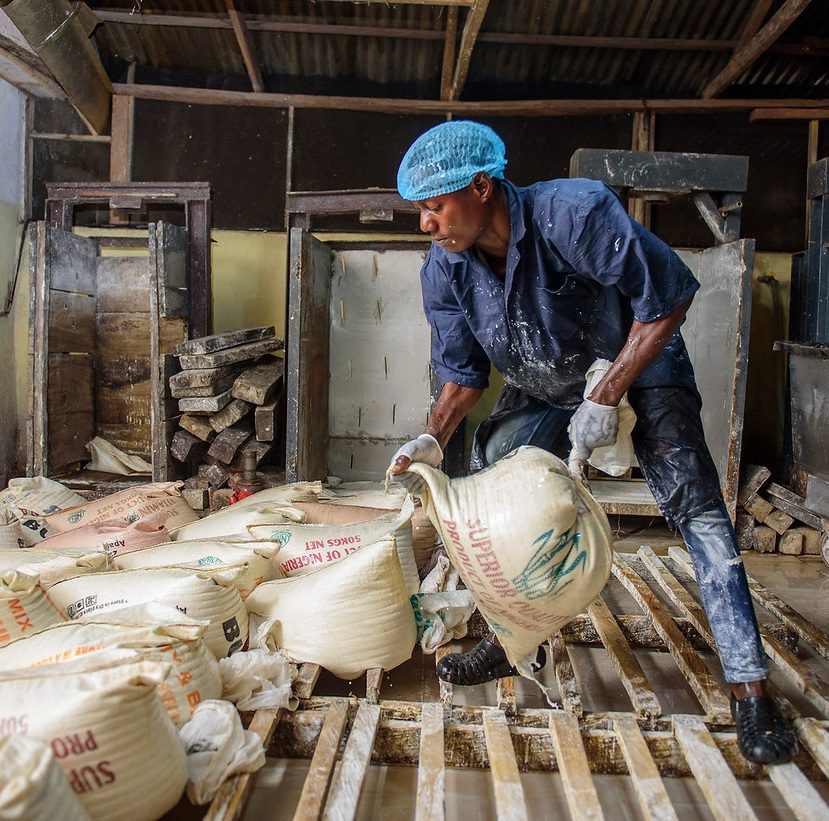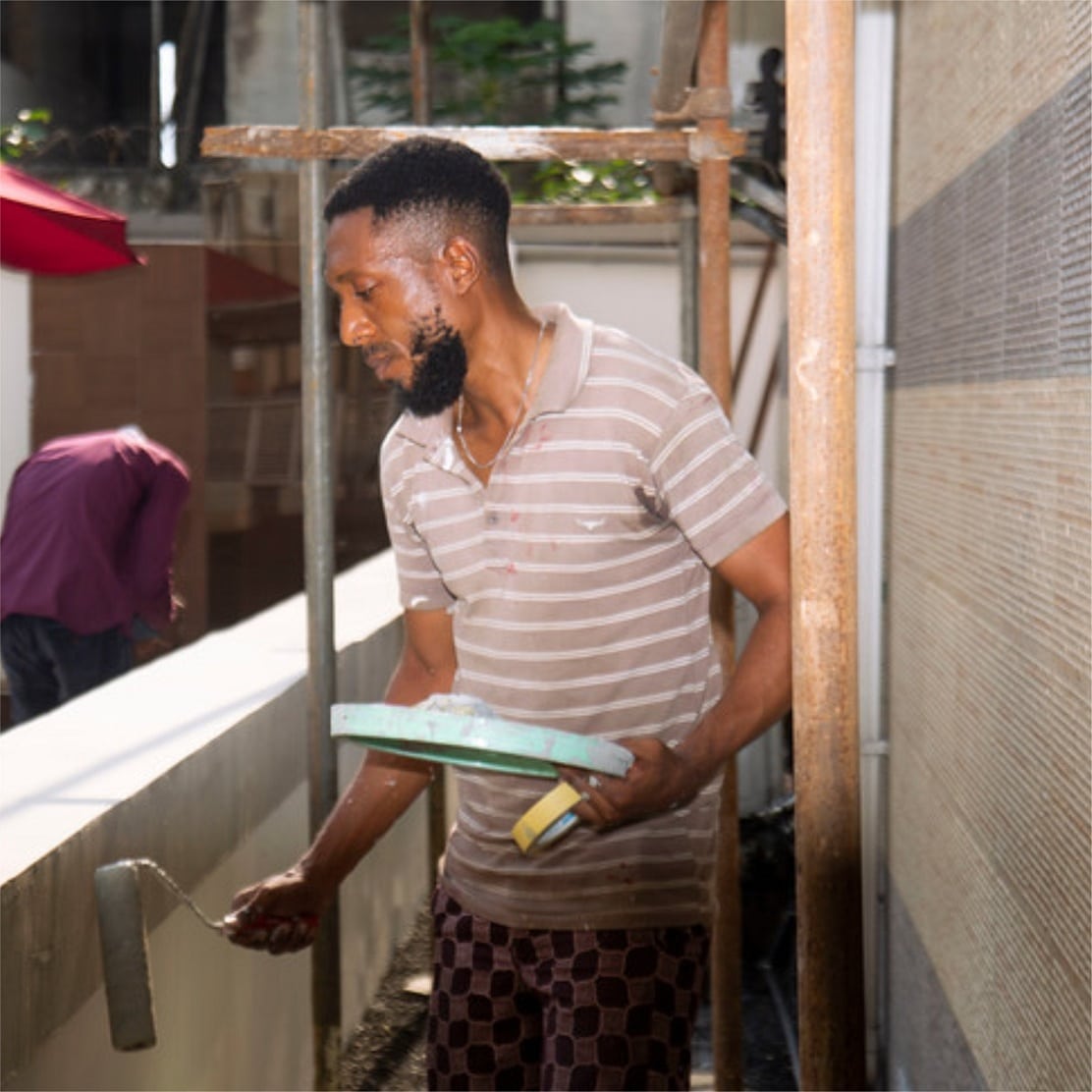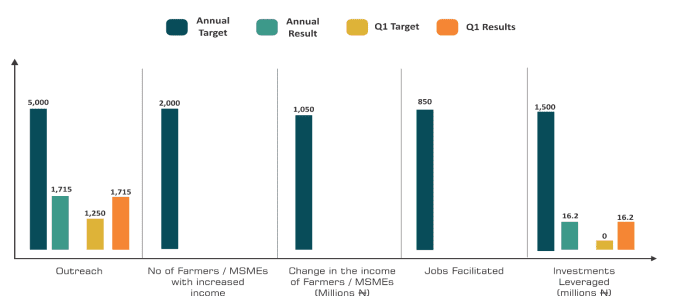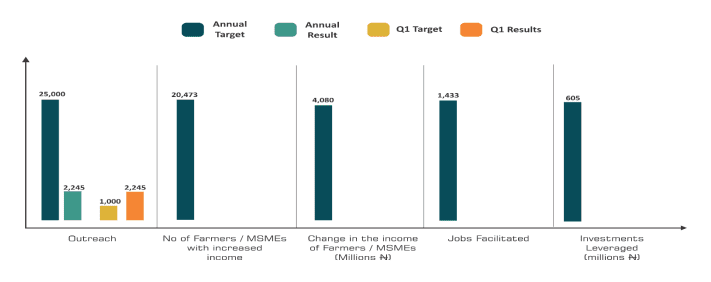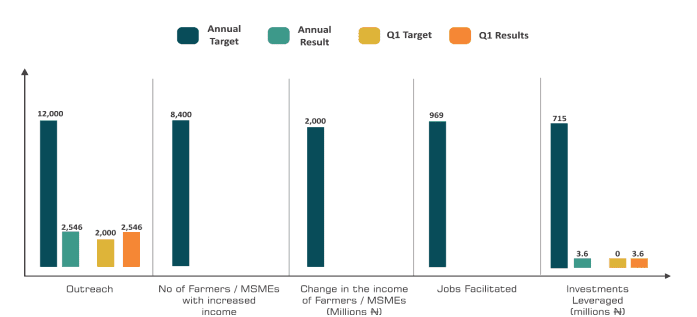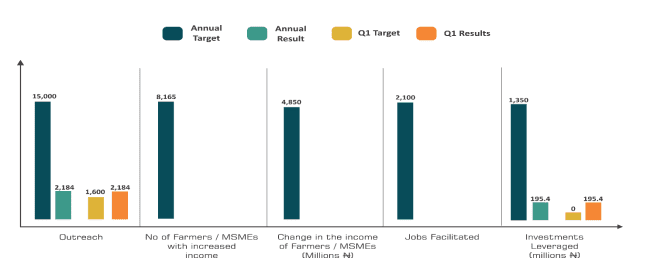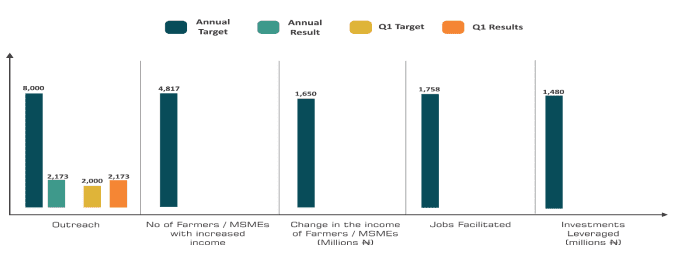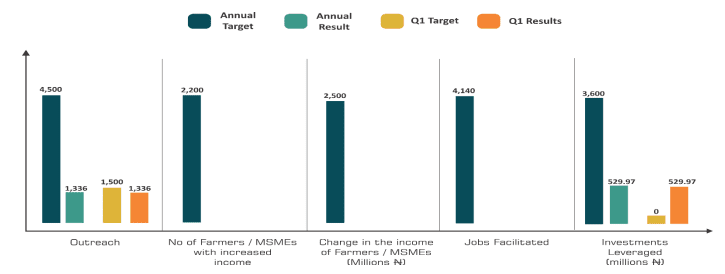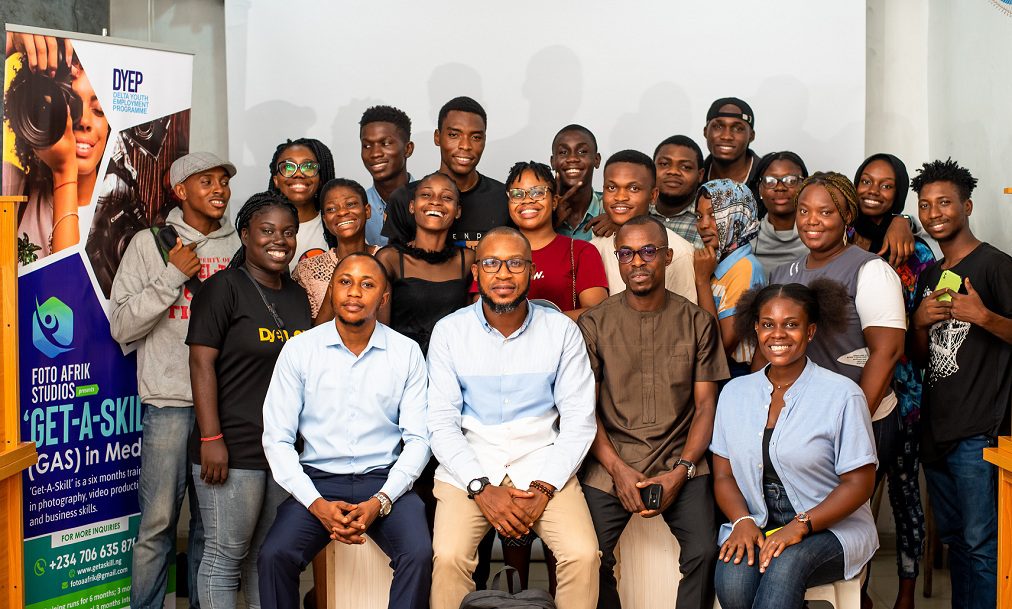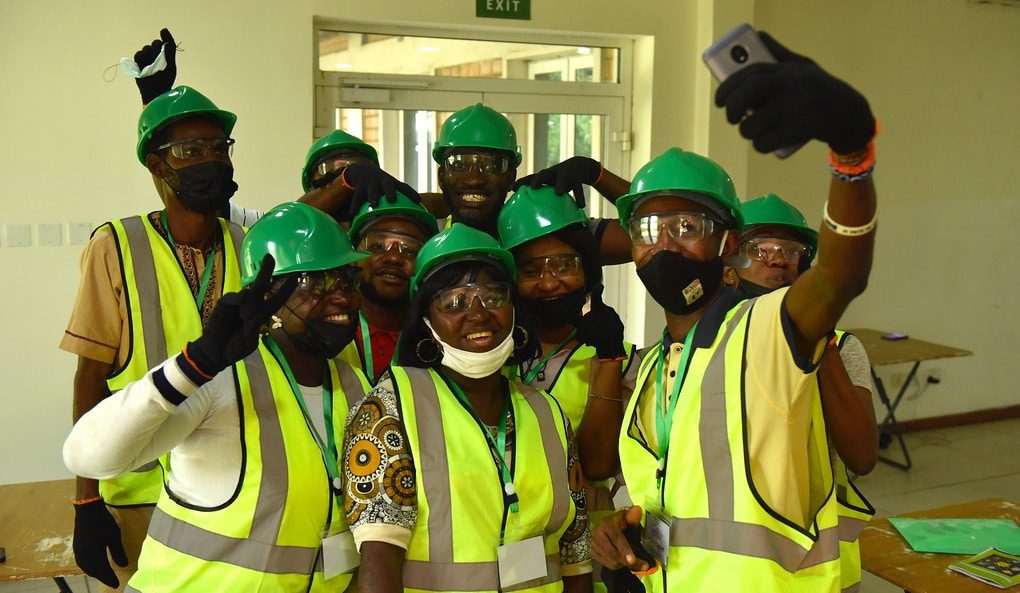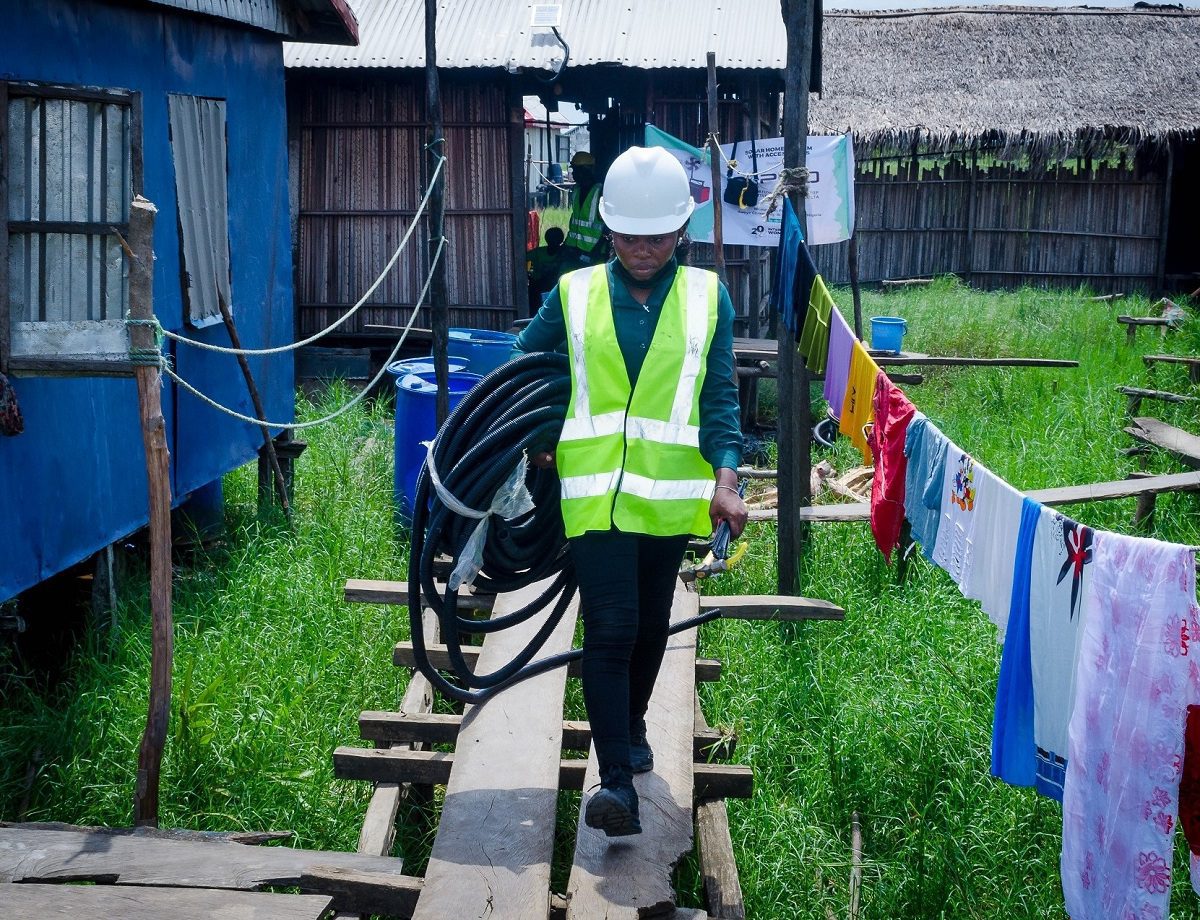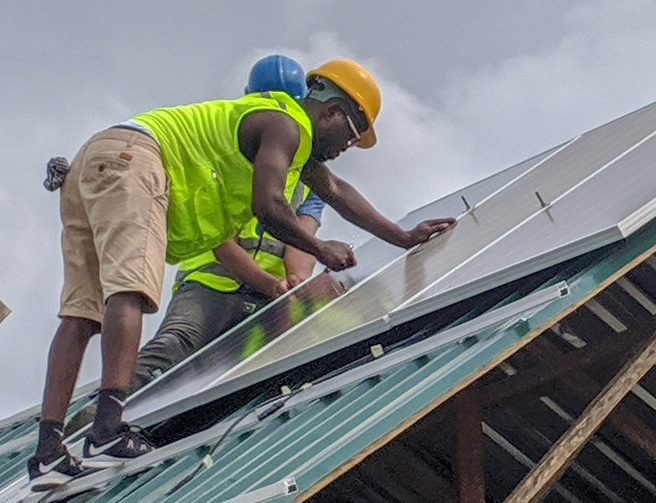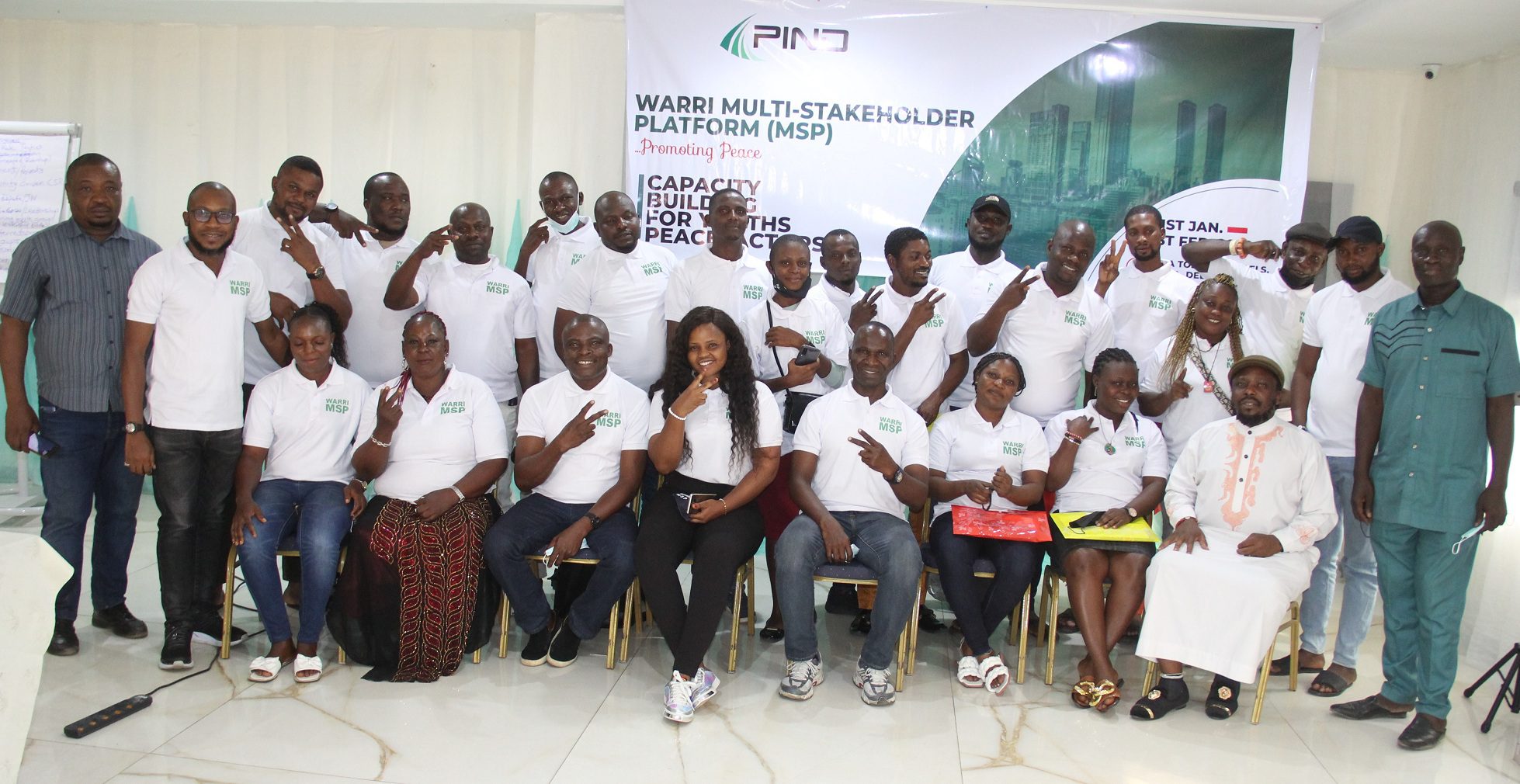PIND 2022 Q1 PROGRESS REPORT
January – March 2022
This report highlights the achievements of PIND’s program interventions in the Niger Delta from January – March 2022 (Quarter 1, 2022), and provides relevant information about program management, lessons learned, and plans for the next quarter. The report demonstrates how PIND is driving change to ensure broadbased economic growth in the Niger Delta. PIND’s activities are designed to promote and sustain a culture of learning and adaptation, to build a process where evidence plays a significant role in determining policy direction and interventions in economic development, peace building, advocacy, and capacity building of both government institutions and civil society in the Niger Delta. PIND made significant progress in its initiatives this quarter. The following are highlights of its achievements:

Powering Coastal Rural Communities

Reducing Poverty by Overcoming Market Failures

Equitable increase in employment and incomes

Mitigating Conflicts by Implementing Interventions
SUMMARY OF PROGRESS
Economic Development
PIND incentivized MSMEs and participating farmers to invest ₦745.19 million (₦215.21 million – Equity and ₦529.98 million – debt) to implement good agricultural practices, technological innovations, purchase inputs and other capital expenditures.
Market Systems Development
During the quarter, PIND’s market development projects continued to demonstrate progress towards widespread change, 12,199 farmers and agricultural entrepreneurs (41% of them being women) were reached with information and knowledge on best practices and efficient technologies in the crop and noncrops sectors.
Access to Energy
PIND championed community-centered initiatives that offer high-quality energy access to coastal communities, driving the market for low–carbon, low–cost solutions. In Q1, 2022, a PIND-supported partner, A4&T power solutions powered on a 54kWp hybrid solar mini grid in Laoso community in Ondo State. As a result, 4,130 people from 650 households and 230 businesses there accessed electricity.
Youth Employment Program (YEP)
The first set of 631 youths (47% female) on the Youth Employment Pathways program in Delta State (DYEP) completed technical and vocational skills training across four intervention sectors of ICT, building construction, agriculture, and services. Nine of these trainees were people with disabilities (PWDs). Of these, 505 (80%) have transitioned to income earning positions or apprenticeships (232 in apprenticeships positions, 161 have started small scale businesses, while 112 have secured direct waged employment).
Sombriero Kapital
In the first quarter of 2022, PIND through Sombreiro Kapital facilitated loans worth N30,172,800 to 195 business owners, including 15 fish processors in the GMOU communities, and 180 smallholder cocoa farmers in Ondo State. It is anticipated that the income of businesses supported would increase due to the relatively low-interest rate of 9% per annum which is being charged by Sterling bank Plc for the loans.
Peacebuilding
PIND assisted 51 peace actors to constructively resolve emerging conflicts in various communities in the Niger Delta. This led to 48 quality actions being taken to mitigate conflict in different locations across the region.
Communications
By amplifying PIND’s communications this quarter, 3,560,473 people gained new or increased awareness about PIND, through its platforms: newsletters, social media, website, email inquiries, forums and traditional mainstream media. Also, PIND attracted 15 public endorsements from stakeholders and garnered 80 positive media mentions of its work and activities during the same period.
Advocacy
In Q1, 2022, PIND worked to ensure access to arable land in the Niger Delta. In Edo state the arable land review committee worked with the Edo GIS department to map all the free-ranged land for agriculture, engage the communities that border the land, and develop a flow chart for accessing land for agriculture in the State. Also PIND evidenced spend by the Cross River State Government on the Growth and Development Strategy (GDS) facilitated for the State.
Capacity Building
To support GMoU communities PIND met with associations of fisherfolk in Koluama 1 and 2 (Bayelsa State), Awoye (Ondo), and Ugborodo (Delta State) to ascertain their training needs. A training was carried out for 23 fisherfolk in Awoye, to expose them to appropriate fishing tools and support them with linkages to equipment suppliers. In addition, practical demonstrations on the benefits of chorkor ovens were done in two communities: Bateren and Opuama in Delta State with 75 fish processors in attendance, resulting in the adoption of 20 ovens in the two communities.
Gender Empowerment & Social Inclusion (GESI)
In collaboration with the Centre for Gender and Development Studies (CGDS) of the University of Port Harcourt, PIND launched an advocacy campaign to end the targeted killing of women and girls for ritualistic purposes and other forms of violence against women and girls in the Niger Delta.
ECONOMIC DEVELOPMENT
-
As a result, 12,199 new farmers and enterprises were reached directly with information and knowledge on best practices and efficient technologies.
-
Also, within the quarter, the net funds leveraged by the farmers/MSMEs under the MSD project was ₦865.19 million, from adopting the improved technologies on their farms.
KEY ACHIEVEMENTS: AQUACULTURE
PIND’s interventions in the aquaculture sector focus on improving the efficiency and productivity of fish farmers and processors, through improved knowledge of best fish farming practices, access to improved processing technology, as well as access to quality input, market, and finance for farmers. The sector’s activities are driven by aquaculture service providers working with input companies, fabricators, and other market actors. In 2022, the plan is to reach an additional 5,000 fish farmers and processors through the promotion of improved technology in coastal communities, adoption of improved practices amongst fish farmers in the region and facilitating access to finance for farmers and processors in the coastal communities of the Niger Delta.
In the quarter under review, PIND deepened its work with the network of aquaculture service providers to further create awareness on the use of quality inputs and to build the capacity of fish farmers and processors, to access funds for equipment and input purchase. PIND also continued its support to selected hatchery operators to produce and promote quality fish seeds for farmers, in addition to overseeing and tracking the expansion of the training on good pond management and business practices to more farmers and processors, through service providers and input companies in the region.
KEY ACHIEVEMENTS: CASSAVA
The Cassava value chain interventions are designed to improve the productivity and incomes of actors in the cassava sector. This is achieved through incentivizing partners to invest in activities that will improve access to information and quality inputs as well as markets for cassava farmers. Since 2015, PIND has continued to identify and partner with key value chain actors – agro-input companies/agro-dealers, who promote the sale and adoption of their products through demonstrations and training across cassava farming clusters in the region. These partners continue to report increased sales, due to the collaborations, and farmers who participate in the program also report increased yields and income from their farms.
KEY ACHIEVEMENTS: COCOA
PINDs Cocoa value chain intervention activities focus on improving the productivity and income of farmers through the adoption of good agricultural practices and technologies. To achieve this, the cocoa project works with a network of support market actors (agro-input companies, agro-input dealers, agro equipment dealers, and Farm Service Providers – FSPs) to improve access to agricultural information, agro-inputs, and efficient technologies to farmers in the cocoa sector. Since 2019, the sector has been strategically focusing on three intervention areas, viz: Productivity improvement, access to quality seedlings, and quality enhancement in five cocoa-producing states of Abia, Akwa Ibom, Cross River, Edo, and Ondo.
KEY ACHIEVEMENTS: PALM OIL
PIND’s interventions in the palm oil sector focus on stimulating best management practices (BMPs) among farmers and improving access to palm oil seedlings. These interventions aim to increase the productivity and income of farmers and small processors in the region. The interventions utilize the market systems development approach and are driven by agro-dealers, fabricators, input companies, and palm seed nursery operators and producers who have the incentives to provide a range of services and products that improve the productivity of farmers and processors. Previous interventions included stimulating the use of harvesting technologies and improved processing equipment.
In 2022, PIND plans to expand outreach to an additional 15,000 farmers, leveraging the adaptation strategies deployed in the previous year. Additionally, PIND plans to deepen the adoption of best practices by linking farmers and market actors to financial institutions to access inputs and equipment. It also plans to continue its work with seed-producing companies to expand the distribution of quality seeds to more farmers in the region. Last year, PIND on-boarded one new seed producer and promoted the business finders’ model which led to 304 palm oil farmers purchasing and planting 274,825 seedlings in the region. PIND plans to onboard another seed producer and support it to increase its network of nursery operators to enable it to reach more farmers.
KEY ACHIEVEMENTS: POULTRY
The poultry value chain interventions are designed to improve the productivity and income of poultry farmers in the Niger Delta through the adoption of good poultry practices and linkages to quality inputs such day-old chicks (DoCs), vaccines and feed, as well as markets and finance to help farmers in their growth expansion plans. The sector’s activities are driven by Poultry Service Providers (PSPs) and Village Level Dealers (VLDs) working with input companies, chicken processors, and other market actors, who see the incentive to make more money by providing their services and products commercially to farmers, to improve their productivity.
PIND’s target for 2022 is to reach an additional 8,000 poultry farmers with information on good poultry practices (GPP) and to facilitate access to quality inputs, markets and finance for expansion.
KEY ACHIEVEMENTS: MSME DEVELOPMENT & LINKAGES
The MSME Development and Linkages project aims to stimulate a market that creates a dynamic and diversified set of strong local enterprises that can meet the demand created by large buyers operating within the Niger Delta. This then strengthens the local economic environment capable of driving economic growth and job creation. The project also strengthens platforms that enable micro, small, and medium enterprises (MSMEs) to access quality business support services, market, and funding opportunities that enable enterprises to grow and be more competitive in both local and global markets.
The project activities are driven by business services providers (BSPs) whose capacities have been strengthened by PIND to enhance the growth of local enterprises. These BSPs work in partnership with financial institutions, large corporate buyers, chambers of commerce, and other public and private stakeholders important to the development of the MSME sector; to organize business linkages and investment forums, as well as to access new market and funding opportunities necessary for MSME development.
- Aquaculture
-
KEY ACHIEVEMENTS: AQUACULTURE
PIND’s interventions in the aquaculture sector focus on improving the efficiency and productivity of fish farmers and processors, through improved knowledge of best fish farming practices, access to improved processing technology, as well as access to quality input, market, and finance for farmers. The sector’s activities are driven by aquaculture service providers working with input companies, fabricators, and other market actors. In 2022, the plan is to reach an additional 5,000 fish farmers and processors through the promotion of improved technology in coastal communities, adoption of improved practices amongst fish farmers in the region and facilitating access to finance for farmers and processors in the coastal communities of the Niger Delta.
In the quarter under review, PIND deepened its work with the network of aquaculture service providers to further create awareness on the use of quality inputs and to build the capacity of fish farmers and processors, to access funds for equipment and input purchase. PIND also continued its support to selected hatchery operators to produce and promote quality fish seeds for farmers, in addition to overseeing and tracking the expansion of the training on good pond management and business practices to more farmers and processors, through service providers and input companies in the region.
- Cassava
-
KEY ACHIEVEMENTS: CASSAVA
The Cassava value chain interventions are designed to improve the productivity and incomes of actors in the cassava sector. This is achieved through incentivizing partners to invest in activities that will improve access to information and quality inputs as well as markets for cassava farmers. Since 2015, PIND has continued to identify and partner with key value chain actors – agro-input companies/agro-dealers, who promote the sale and adoption of their products through demonstrations and training across cassava farming clusters in the region. These partners continue to report increased sales, due to the collaborations, and farmers who participate in the program also report increased yields and income from their farms.
- Cocoa
-
KEY ACHIEVEMENTS: COCOA
PINDs Cocoa value chain intervention activities focus on improving the productivity and income of farmers through the adoption of good agricultural practices and technologies. To achieve this, the cocoa project works with a network of support market actors (agro-input companies, agro-input dealers, agro equipment dealers, and Farm Service Providers – FSPs) to improve access to agricultural information, agro-inputs, and efficient technologies to farmers in the cocoa sector. Since 2019, the sector has been strategically focusing on three intervention areas, viz: Productivity improvement, access to quality seedlings, and quality enhancement in five cocoa-producing states of Abia, Akwa Ibom, Cross River, Edo, and Ondo.
- Palm Oil
-
KEY ACHIEVEMENTS: PALM OIL
PIND’s interventions in the palm oil sector focus on stimulating best management practices (BMPs) among farmers and improving access to palm oil seedlings. These interventions aim to increase the productivity and income of farmers and small processors in the region. The interventions utilize the market systems development approach and are driven by agro-dealers, fabricators, input companies, and palm seed nursery operators and producers who have the incentives to provide a range of services and products that improve the productivity of farmers and processors. Previous interventions included stimulating the use of harvesting technologies and improved processing equipment.
In 2022, PIND plans to expand outreach to an additional 15,000 farmers, leveraging the adaptation strategies deployed in the previous year. Additionally, PIND plans to deepen the adoption of best practices by linking farmers and market actors to financial institutions to access inputs and equipment. It also plans to continue its work with seed-producing companies to expand the distribution of quality seeds to more farmers in the region. Last year, PIND on-boarded one new seed producer and promoted the business finders’ model which led to 304 palm oil farmers purchasing and planting 274,825 seedlings in the region. PIND plans to onboard another seed producer and support it to increase its network of nursery operators to enable it to reach more farmers.
- Poultry
-
KEY ACHIEVEMENTS: POULTRY
The poultry value chain interventions are designed to improve the productivity and income of poultry farmers in the Niger Delta through the adoption of good poultry practices and linkages to quality inputs such day-old chicks (DoCs), vaccines and feed, as well as markets and finance to help farmers in their growth expansion plans. The sector’s activities are driven by Poultry Service Providers (PSPs) and Village Level Dealers (VLDs) working with input companies, chicken processors, and other market actors, who see the incentive to make more money by providing their services and products commercially to farmers, to improve their productivity.
PIND’s target for 2022 is to reach an additional 8,000 poultry farmers with information on good poultry practices (GPP) and to facilitate access to quality inputs, markets and finance for expansion.
- MSMEs
-
KEY ACHIEVEMENTS: MSME DEVELOPMENT & LINKAGES
The MSME Development and Linkages project aims to stimulate a market that creates a dynamic and diversified set of strong local enterprises that can meet the demand created by large buyers operating within the Niger Delta. This then strengthens the local economic environment capable of driving economic growth and job creation. The project also strengthens platforms that enable micro, small, and medium enterprises (MSMEs) to access quality business support services, market, and funding opportunities that enable enterprises to grow and be more competitive in both local and global markets.
The project activities are driven by business services providers (BSPs) whose capacities have been strengthened by PIND to enhance the growth of local enterprises. These BSPs work in partnership with financial institutions, large corporate buyers, chambers of commerce, and other public and private stakeholders important to the development of the MSME sector; to organize business linkages and investment forums, as well as to access new market and funding opportunities necessary for MSME development.
The Delta State Youth Employment Program (DYEP) commenced the implementation of technical vocational and soft skills training with nine implementing partner organizations. In the first year, four economic growth sectors- ICT, building construction, agriculture and services and 17 technical vocational skill areas were covered. Soft skills were mainstreamed in the curriculum, including a module on conflict sensitivity and peace building.
The project was implemented in two cities (Asaba & Warri) in Delta State. Trainings which had commenced in November 2021 were completed by Q1, 2022 (March 2022), across the 11 privately owned Technical, Vocational and Education Training (TVET) centers in the two cities. Participants were trained in 17 occupational skill areas and 631 youths, aged 16 to 30 years, successfully completed the technical skills training. 37% of those who completed the training came from Asaba, while 63% came from Warri. 73 of the youths who were trained in Warri came from coastal GMOU communities. 47% of successful participants were female, while nine were PWDs.
With the support of the implementing partners 112 of the youths who completed the training got direct waged employment, while 161 youths started small-scale enterprises of their own (48 of these people have started small scale farms), making a total of 273 youths with income earning opportunities. Furthermore, 232 youths have been placed in apprenticeship and internship positions, which will enhance their chances of accessing waged employment in the future. This implies that of the 631 youths who completed the training, 505 of them (80%) have transitioned to income earning positions or apprenticeships.
The remaining 126 youths will also be supported to transition to income earning roles. Of those that have been linked to waged employment, 81 are in ICT, 21 in solar installation, seven in construction and three in services (such as fashion design etc).
The coastline rural communities in the Niger Delta region of Nigeria suffer poor rural electrification, with many of the communities not having access to regular electricity supply to power basic economic assets and household needs, leading to reduced economic activities. Expectations for connection to the National grid anytime soon are unlikely due to highcost implications and the difficult terrains. Since 2018, PIND has been addressing this gap through alternative and affordable off-grid solutions, capable of targeting not only basic energy needs (i.e., lighting and cooking energy), but also productive use of energy at both household and rural enterprise levels (such as use in barber shops and beauty salons).
Outreach
PIND’s Access to energy program had an outreach of 4,268 in Q1 2022. This includes 4,130 persons across 230 businesses and 650 households now enjoying access to clean energy (electricity) and another 136 persons reached through knowledge sharing, demonstrations, community engagement, as well as two new village-level energy cabin operators who have received training on the technical and business aspects of the community solar power plant.
PIND’s pioneer power developer partner secures catalytic capital to scale up mini grid to Ondo farming community
PIND’s Access to Energy program continues to provide technical program support to A4&T in their drive to scale up electricity through the energy cabins to underserved communities in Ondo State as a going concern and in Q1 2022, A4&T powered on a 54kWp hybrid solar mini-grid in Laoso community in Ondo State. A4&T’s capability to secure commercial capital to fund the building of a 54kWp hybrid solar mini-grid in Laoso community signifies a major milestone for the solar mini-grid development in the region, since the projects were previously unattractive to the commercial banks. In total, this singular project leveraged N120 Million in private sector investments.
The mini grid provided connections to 230 MSMEs and 650 households in the community. Laoso is an agricultural community with Cocoa as the main commodity, and the business connections will be utilized among productive-energy users. This project involved 24 Technicians and 10 local temp workers working full time for 8 weeks, thereby creating an employment window for seasonal and temp workers while also contributing to the local economic prosperity. In total, the mini grid provided electricity access to an estimated 4,130 persons across the 650 households and 230 businesses owners. This project will also be benefiting from the World Bank’s Result-Based-Financing for mini-grids in rural communities and thereby contribute up to 60% of the CAPEX towards de-risking A4&T’s investments, which will enable the company to expand its energy portfolio across Ondo state.
Attracting investments to the Niger Delta coastal communities
PIND’s facilitating role in the renewable energy market received a boost in Q1 2022, and a total of 136 key stakeholders in both the supply and demand side of energy goods and services were engaged through information and demonstrations on community energy projects. Meetings were held with different energy stakeholders as part of the activities to stimulate interests and attract investments into the Niger Delta off-grid electricity market. A total of 7 such meetings were held with partners with business interests in Bayelsa, Delta, Edo, Ondo, and Rivers States. PIND met with mini-grid developers such as Darway Coast Limited and Ashdam Solar limited; traditional solar rooftop installers such as ProSolar Limited, EnergyPro Limited, Irradiance Limited; and community-led social enterprises such as the advocacy center. PIND also met with Ekovolt – a data solutions company that is partnering with the United States Trade and Development Agency (USTDA) to explore data connectivity in last mile communities.
Other efforts to attract new investors and develop partnerships that can scale up solar mini-grids across the Niger Delta, include a model-sharing workshop targeted at members of the Renewable Energy Service Providers of Nigeria (RESPON) and Renewable Energy Association of Nigeria (REAN) – two key stakeholders in the supply side of mini-grids and equipment in the country. 12 members (11M, 1F) attended the event which presented the learnings from PIND’s Energy Cabin pilots and scale-up over the last 36 months. The activity explored opportunities for collaboration on mini-grids, community solar refrigeration solutions, Solar-Home-Systems, and other innovative access-to-energy interventions, across coastal communities in Delta, Ondo, and Bayelsa states.
Supporting the development of partnerships to drive viable community energy business models for the GMOUs
With PIND’s support, two GMOU communities in Gbaramatu kingdom (Opuede and Kurutie) were assessed for mini-grid commercial viability by private sector power developers who are interested in adopting and deploying the PIND energy cabin business models in these communities. As a result, the leadership of Kurutie community have commenced discussions with one of the power developers with a view to signing a partnership agreement. Similarly, in Koluama 2, a GMOU community in Bayelsa state, PIND facilitated a meeting between the leadership of KOTEF fishing cooperative and Vectis business options limited – towards sensitizing the community on the communal philosophy of a refrigeration hub. Koluama 2 is a predominantly fishing community in Bayelsa state lying along the coastline of the Atlantic. The community has been identified and assessed as a viable location for solar refrigeration using PIND’s electricity-as-a-service model, therefore the community engagement was complemented with a technology field day that involved participation from 24 members (17M, 7F) of the KOTEF fishing cooperative. This activity forms part of the preliminary stages toward setting up a commercial solar refrigeration hub in the community.
Closing the Energy Access and Gender gap through inclusive programming
PIND recognizes that women are typically underrepresented across the community and household energy beneficiary’s spectrum, therefore in Q1 2022, PIND’s various demonstrations, workshops, and community engagement activities were undertaken to ensure access for and participation by all. This was achieved in two key instances where about 44% women participation was recorded (Kpokugbene and Kurutie) and another encouraging 29% women participation in Koluama 2 community. The same best practice was cascaded to PIND’s partners and private sector power developers through continuous project handholding, and they have been able to advocate an increase in the productive use of electricity for female-headed businesses and female household members within their various communities. Mainstreaming women participation through such programming fundamentals helps to amplify the voices of women in PIND interventions.






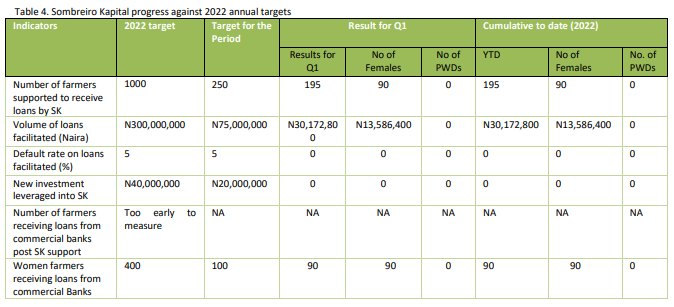

PEACEBUILDING
This section highlights key achievements of the Peace Building program in Q1, 2022
PIND continued interventions in conflict prevention, conflict management and peacebuilding in the region this quarter. PIND’s role in and its support for grassroots-led conflict resolution initiatives are examples of both the scope and the limits of long-term peacebuilding projects. Recognizing the need for an integrated and comprehensive approach to tackling the complex causes and drivers of conflict in the region, PIND adopted a plan of action that aimed to keep the level of violence as low as possible, particularly in key communities of interest, while also building the social infrastructure and social capital of peace actors across the region for long term sustainable peace. This ushered in a paradigm shift reflecting a different way of working on problems of militancy, election violence, gang/cult violence, communal violence, and the cross-cutting issue of Violence Affecting Women and Girls (VAWG). PIND aims to achieve this objective through the active engagement of 5,000 peace actors in conflict mitigation and reduction.
